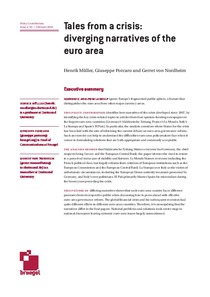Tales from a crisis: diverging narratives of the euro area
" "Economic analyses largely ignore Europe’s fragmented public sphere, a feature that distinguishes the euro area from other major currency areas. This Policy Contribution identifies how narratives of the crisis developed since 2007, by identifying the key crisis-related topics in articles...
| Main Authors: | , , |
|---|---|
| Institution: | ETUI-European Trade Union Institute |
| Format: | TEXT |
| Language: | English |
| Published: |
Brussels
2018
Bruegel |
| Subjects: | |
| Online Access: | https://www.labourline.org/KENTIKA-19398975124911161579-Tales-from-a-crisis-diverging-.htm |
| Summary: | "
"Economic analyses largely ignore Europe’s fragmented public sphere, a feature that distinguishes the euro area from other major currency areas.
This Policy Contribution identifies how narratives of the crisis developed since 2007, by identifying the key crisis-related topics in articles from four opinion-forming newspapers in the largest euro-area countries (Germany’s Süddeutsche Zeitung, France’s Le Monde, Italy’s La Stampa and Spain’s El País). In particular, the analysis considers where blame for the crisis has been laid with the aim of informing the current debate on euro-area governance reform. Such an exercise can help to understand the difficulties euro-area policymakers face when it comes to formulating solutions that are both appropriate and commonly acceptable.
The analysis showed that Süddeutsche Zeitung blames everyone but Germany, the chief suspects being Greece and the European Central Bank; the paper stresses the need to return to a perceived status quo of stability and fairness. Le Monde blames everyone including the French political class, but largely refrains from criticism of European institutions such as the European Commission and the European Central Bank. La Stampa sees Italy as the victim of unfortunate circumstances, including the European Union austerity measures promoted by Germany, and Italy’s own politicians. El País primarily blames Spain for misconduct during the boom years preceding the crisis.
This picture of differing narratives shows that each euro-area country faces different pressures from its respective public when discussing how to press ahead with effective euro-area governance reform. The global financial crisis and the subsequent recession had quite different effects in different euro-area countries. Therefore, it is unsurprising that the narratives differ in the four papers. National problems and solutions took centre stage in national discourses leaving systemic euro-area issues largely unmentioned." |
|---|---|
| Physical Description: | 12 p. Digital |

